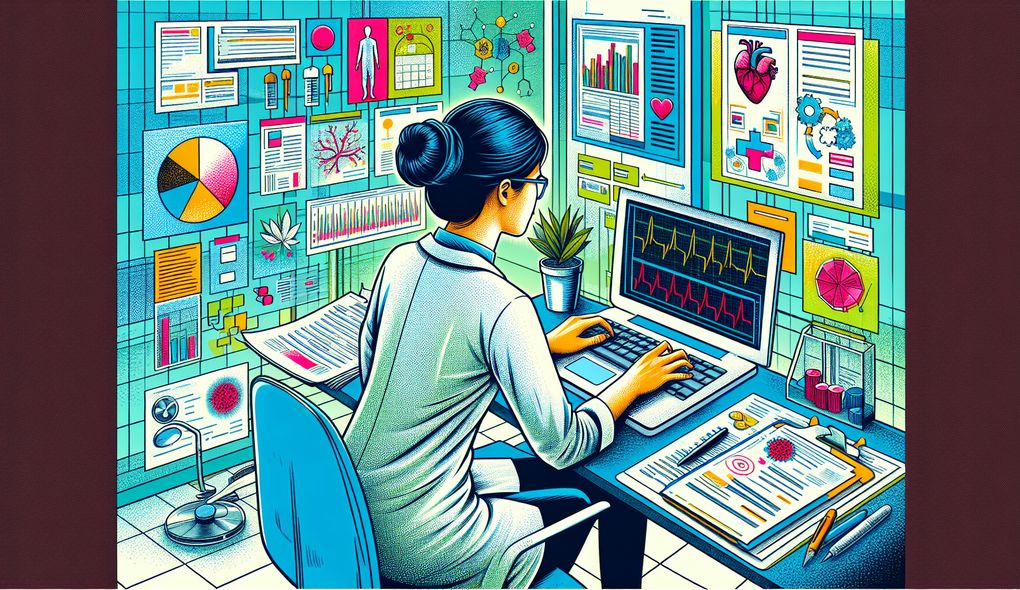What strategies would you use to educate physicians and clinical staff on best practices for clinical documentation as a Clinical Documentation Improvement Specialist?
SENIOR LEVEL

Sample answer to the question:
As a Clinical Documentation Improvement Specialist, I would employ a variety of strategies to educate physicians and clinical staff on best practices for clinical documentation. Firstly, I would conduct regular educational sessions, both in-person and online, to provide an overview of the importance of accurate and complete clinical documentation. I would also utilize case studies and real-life examples to illustrate the impact of documentation on coding and reimbursement processes. Furthermore, I would develop educational materials, such as tip sheets and guidelines, to serve as quick references for physicians and clinical staff. Additionally, I would collaborate with the training department to incorporate documentation best practices into onboarding programs for new clinical staff members. Lastly, I would leverage data analytics tools to identify areas for improvement and tailor educational interventions based on specific documentation deficiencies or patterns. By utilizing these strategies, I believe I can effectively educate physicians and clinical staff on best practices for clinical documentation.
Here is a more solid answer:
To educate physicians and clinical staff on best practices for clinical documentation, I would utilize a multi-faceted approach. Firstly, I would conduct interactive training sessions that incorporate real-life case studies and examples. These sessions would not only highlight the importance of accurate documentation but also provide practical tips on how to improve it. In addition to in-person sessions, I would create online learning modules that can be accessed at any time for convenience. To ensure compliance with healthcare laws and regulations, I would incorporate relevant legal requirements and guidelines into the education materials. I would also provide resources such as tip sheets and quick reference guides that summarize the key points of clinical documentation best practices. Furthermore, I would collaborate with the IT department to develop data analytics tools that can identify documentation gaps and provide feedback to physicians and clinical staff. By utilizing these strategies, I believe I can effectively educate physicians and clinical staff on best practices for clinical documentation while ensuring compliance with healthcare laws and regulations.
Why is this a more solid answer?
The solid answer expands on the basic answer by providing specific details and examples. It addresses the evaluation areas by incorporating healthcare laws and regulations into the education materials and mentioning collaboration with the IT department for data analytics tools. However, it can still be improved by providing more specific examples of the types of case studies and legal requirements that would be included in the training sessions and materials.
An example of a exceptional answer:
As a seasoned Clinical Documentation Improvement Specialist, I have developed a comprehensive approach to educate physicians and clinical staff on best practices for clinical documentation. Firstly, I would conduct interactive training sessions that simulate real-life scenarios, using anonymized patient cases from our own healthcare system. This approach not only engages participants but also allows them to apply the best practices in a safe learning environment. To ensure compliance with healthcare laws and regulations, I would collaborate with our legal team to provide specific guidelines and updates tailored to our organization. Additionally, I would develop an online portal that includes a variety of educational resources, such as video tutorials, interactive quizzes, and forums for peer-to-peer learning. This platform would allow physicians and clinical staff to access information and seek clarification at their convenience. Furthermore, I would leverage our data analytics tools to generate personalized reports for each physician and clinical staff member, highlighting areas of improvement and providing actionable recommendations. These reports would be discussed in one-on-one coaching sessions, where I would provide tailored guidance and support. By implementing this comprehensive approach, I am confident that I can effectively educate physicians and clinical staff on best practices for clinical documentation while ensuring compliance and fostering continuous improvement.
Why is this an exceptional answer?
The exceptional answer goes above and beyond by providing specific and innovative strategies for educating physicians and clinical staff. It incorporates simulated patient cases, collaboration with the legal team, and personalized coaching sessions based on data analytics. The answer demonstrates a deep understanding of the job requirements and showcases the candidate's experience and expertise. The only area for improvement would be to provide more specific details on the features and topics covered in the online portal.
How to prepare for this question:
- Familiarize yourself with relevant healthcare laws, regulations, and standards. Stay updated on any changes or updates in the field.
- Develop a strong understanding of medical coding guidelines, such as ICD-10 and CPT coding, as they are crucial for accurate clinical documentation.
- Take courses or seek certifications in Clinical Documentation Improvement, such as CCDS or CDIP, to demonstrate your commitment to professional development.
- Gain experience in using data analytics tools for reporting and performance analysis, as proficiency in this area is stated as a requirement in the job description.
- Practice presenting and delivering information in a clear, concise, and constructive manner. Consider joining Toastmasters or taking public speaking courses to improve your communication skills.
- Stay informed about the latest advancements in electronic health record (EHR) systems and medical coding software, as proficiency in these tools is essential for the role.
What are interviewers evaluating with this question?
- Ability to educate medical staff
- Familiarity with healthcare laws and regulations
- Proficiency in using data analytics tools

